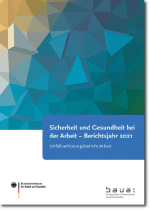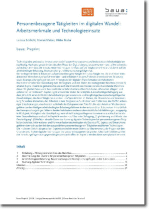Promoting and maintaining work ability and employability throughout working life
Demographic change is resulting in ageing workforces. Within this context, the Federal Institute for Occupational Safety and Health (BAuA) develops and communicates preventive measures and concepts in order to maintain workers’ health and capacity to work over their entire working life.
Among the entire labour force potential, the average age of employees rises in the medium and long term. Over the past years, companies and society have successfully challenged the ageing of the work force and succeeded in improving the employment opportunities for older workers. The employment rate of people aged between 55 and 64 increased from 46% in 2005 to 66% in 2014. In recent years, labour force participation has increased more strongly among those aged 55 to 64 than in any other age group. Moreover, in the group aged 60 to 64, the employment rate has almost doubled over the last ten years from 28% (2005) to 53% (2014).
In terms of the employment of older workers, Germany is currently in second place in the EU - only in Sweden more older workers are in gainful employment. However, despite these undoubted successes, the employment rate for older workers in Germany remains considerably below that of the 15–64 age group as a whole, which stands at 74%.
Aiming for a long period of gainful employment
With this in mind, the aim remains to improve the conditions for a longer working life for as many man and women as possible. At the same time, the question of how to deal with older workers and ageing workforces, where the keywords are recognition and appreciation, is by no means the only issue. Rather, it is also important to address the preventive design of working conditions in order to maintain not only the health but also the working capacity of all workers throughout their entire working life.
Gainful employment as a health-determining factor
At the same time, it must also be taken into account that participation in gainful employment is a resource that affects an individual's health. In this respect, it is not enough to discuss work solely from the perspective of workload and requirements.
Socio-demographic aspects
Within the context of demographic change, BAuA's considerations are not restricted to the ageing of the potential labour force. They also take account of other socio-demographic aspects of the population structure, addressing not only age but also other significant characteristics. These include, for example, gender or migrant background (cultural identity and language skills). The increasing diversity in the labour market offers great opportunities on the one hand, but presents new challenges for companies on the other.
A broader prevention culture
Maintaining and promoting an individual's capacity to work and employability throughout their working life is the decisive strategy for healthy ageing in the workplace. The gradual raising of the statutory retirement age and the aim to close the gap between the actual and statutory retirement ages create a need for measures that are both age- and ageing-appropriate. In particular, the significant variance between occupational groups with respect to health-related early retirement necessitates flexible working models, less strenuous procedures and a new work culture. Within this strategy, one key element is the realisation of a broader culture of prevention in workplaces.
BAuA field of action "Demographic Change"
BAuA adresses the topic of "Demographic Change" in a variety of ways: the results produced by research are used in policy advice and are translated into guidance for workplace practice in order to support safe and healthy workplaces by providing up-to-date knowledge. Research focuses on analysing and assessing the impact of workload and work demands. This forms a basis for analysing the opportunities and risks that gainful employment presents for health, as well as for physical and cognitive performance.
In addition to research, support is also provided to programmes and initiatives that develop practical instruments and trial these directly in the workplace setting. These efforts are focused by the Initiative New Quality of Work (INQA) and its various networks.
Links
INQA Kompetenz gewinnt. Wie wir Arbeits-, Wettbewerbs- und Veränderungsfähigkeit fördern können
INQA Mit Prävention die Zukunft gewinnen. Strategien für eine demografiefeste Arbeitswelt
INQA Demographischer Wandel und Beschäftigung - Plädoyer für neue Unternehmensstrategien
BMAS Erhalt der Beschäftigungsfähigkeit - Arbeitsmedizinische Empfehlung
BMAS 2. Fortschrittsreport "Altersgerechte Arbeitswelt"
Gesunde Arbeitsplätze - für jedes Alter. Kampagne der EU-OSHA 2016-17


